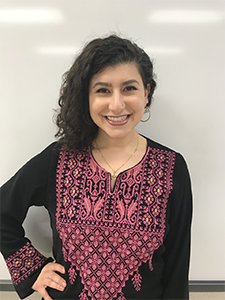February 2020 Featured Educator: Anna Levy

Stories are powerful, especially personal stories. Middle school EL teacher Anna Levy believes that each person’s narrative can influence others. And knowing others’ narratives helps shape her into a better teacher.
Levy has been collecting and honoring stories for most of her adult life. After college she packed her bags and moved to Thailand to teach English as a second language.
“In Thailand, I found out firsthand what it’s like not to speak the native language,” Levy said. “I learned how frustrating it can be when you need help or need to go to the bathroom and you can’t communicate.”
After teaching in Thailand for a year, Levy decided it was time to return to the U.S. She moved to New York City to pursue a career in publishing. However, after a year in publishing, she decided to return to the classroom. Levy moved to Nashville to get a Master’s degree in education and began teaching middle school ELs. She soon discovered that teaching ELs in the U.S. was a different experience with its own set of nuances.
“Teaching in an American classroom brings about unique challenges,” Levy said. “I think it’s more difficult to navigate the relationships with parents and families, and the role of being a teacher in society at large.”
Despite the new set of classroom rigors, Levy seems to be settling into her third year of teaching eighth graders. She oversees two sheltered classrooms, two co-taught classrooms and one PLT period for EL student intervention. Her district serves more than 15,500 active ELs who represent 48 different languages. The four prominent languages are Spanish, Arabic, Kurdish and Somali.
Drawing on her background in writing and publishing, Levy challenges her students to use history to tell their stories. Her students are used to responding to writing prompts—especially ones that tackle complex historical texts like the Declaration of Independence and court cases like Westminster v. Mendez.
“I like to challenge my students to write about history because I want my students to be proud of themselves and recognize that they are part of our country’s history and an active part of shaping our future,” Levy added.
Levy believes that this kind of growth as a writer and student is profoundly important. Instead of focusing all her and her students’ attention on exiting EL services through ACCESS for ELLs, she encourages her students to see every new achievement – small or large – as growth.
“I try to explain to my students that going from a 2.0 to a 2.8 proficiency level is quite an accomplishment,” Levy said. “Using the WIDA rubrics helps me provide my students with the tools they need to improve.”
Engaging families to help inspire growth is another part of Levy’s educator ethos. She uses an app on her phone that can translate her text messages from English into other languages. The app also translates parent texts back into English.
“Even though this technology excites me, we have to be mindful of not relying on technology to translate the world for us,” Levy added. “I am very cognizant of the importance of preserving students’ native languages. Yet, I must set my students up for success with their English language beyond the classroom.”
Creating and sustaining a multilingual classroom community seems to bring Levy back to the power of story.
“All the world sits in my classroom somedays,” Levy shared. “I watch my students play soccer at recess and I have to marvel at the fact that there are students from all over the world and here they are playing soccer together. If that’s not powerful, then I don’t know what is.”





